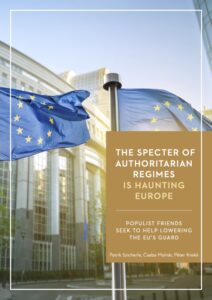How long does it take an authoritarian populist to dismantle the institutions of a liberal democracy so completely that they become no longer salvageable? @JeremyCliffe asks in @NewStatesman https://t.co/c4QjhXLYxE
— Democracy Digest (@demdigest) October 19, 2021
On Sunday 17 October, the Hungarian opposition selected Péter Márki-Zay (known as “MZP”), the mayor of the small southern town of Hódmezővásárhely, as its joint candidate for prime minister. This is significant for two reasons, the New Statesman’s Jeremy Cliffe observes:
- First, the opposition has joined forces for the attempt to unseat [the incumbent Viktor] Orbán. In the 2018 election, Fidesz won 49.3% of the vote; the rest was fragmented between other parties of a wide array of political persuasions. In the first-past-the-post electoral system introduced by Orbán in 2011, that was fatal. This time, the opposition has formed a six-party front (including the centre-left MSZP, the liberal Momentum and the hard-right Jobbik), shared out constituencies in an electoral pact, and has committed to putting up a single candidate to maximise the chances of toppling the sitting prime minister. …
- The second is that in Márki-Zay, the united opposition has chosen a candidate with a decent chance of winning….
 To the surprise, if not dismay of some observers, Hungary has been invited to the Biden administration’s forthcoming Summit for Democracy.
To the surprise, if not dismay of some observers, Hungary has been invited to the Biden administration’s forthcoming Summit for Democracy.
Previous challengers hoping to unseat Mr. Orban, who has been prime minister since 2010, mostly channeled the frustrations and anger of a liberal elite in Budapest, the Times adds. This time, the mayor is fighting Fidesz on its own terms and home turf — small towns and villages where many voters, Mr. Marki-Zay included, once found comfort in Mr. Orban’s conservative message but grew disenchanted with what they see as his corruption, hypocrisy and authoritarian tendencies.
It will be an uphill battle to win against a leader accused of centralizing power, gerrymandering and exerting control of the media to such an extent that Freedom House no longer classes Hungary as a democracy, but a “hybrid regime,” the Post reports. But it’s considered the best chance the opposition has had at ousting Orban’s Fidesz party since it came to power in 2010. An average of national polls compiled by Politico put Fidesz and the united opposition neck and neck.
“It gives the opposition for the first time reasonable odds,” said Gabor Gyori, a senior analyst at the Budapest-based think tank Policy Solutions. “There is a greater possibility of him losing than in any election before.”
 Peter Kreko, (right), the director of Political Capital (above),* a research group in Budapest, described Hungary as “the most captured state with the most centralized media environment” in Europe, the Times adds. Yet he said the new mobilization by Hungary’s opposition parties could change the political dynamic there. “They have a good message: If you fight against populists, things can be different,” said Kreko, a former Reagan-Fascell fellow at the National Endowment for Democracy (NED) .
Peter Kreko, (right), the director of Political Capital (above),* a research group in Budapest, described Hungary as “the most captured state with the most centralized media environment” in Europe, the Times adds. Yet he said the new mobilization by Hungary’s opposition parties could change the political dynamic there. “They have a good message: If you fight against populists, things can be different,” said Kreko, a former Reagan-Fascell fellow at the National Endowment for Democracy (NED) .
Hungary’s election might be the last chance to save a country at the heart of Europe from the slide into autocracy. But more than that, it will be seen as a stress test for liberal democracy internationally, Cliffe adds. How resilient is it really?
Political Capital recently released a report based on a two-year research project entitled “The Specter of Authoritarian Regimes is Haunting Europe,” the NED’s International Forum adds. The report reviews how authoritarian influence, an especially effective tool for Russia, targets individual European Union (EU) states in order to break EU solidarity and manipulate European foreign policy.







